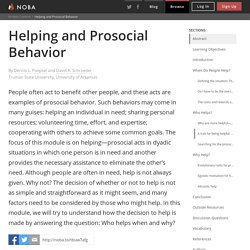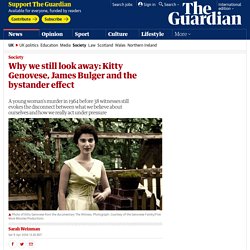

What is the Bystander Effect. Helping and Prosocial Behavior. Go to YouTube and search for episodes of “Primetime: What Would You Do?”

You will find video segments in which apparently innocent individuals are victimized, while onlookers typically fail to intervene. The events are all staged, but they are very real to the bystanders on the scene. The entertainment offered is the nature of the bystanders’ responses, and viewers are outraged when bystanders fail to intervene. They are convinced that they would have helped. But would they? Social psychologists are interested in answering this question because it is apparent that people vary in their tendency to help others. To answer the question regarding when people help, researchers have focused on how bystanders come to define emergencies,when they decide to take responsibility for helping, andhow the costs and benefits of intervening affect their decisions of whether to help.
The bystander effect is complicated. The Bystander Effect. Causes of Bystander Effect. Pluralistic Ignorance. Diffusion of Responsibility. Fear of Legal Repercussions. Fear of Judgement. Acquiring Relevant Skills. Save A Life. Community Emergency Preparedness Programme (CEPP) SCDF Emergency Handbook 2016. How to Enlist Help from Others. Good Samaritan Law. Written Answer by Minister for Law, K Shanmugam, to Parliamentary Question on the introduction of a Good Samaritan law in Singapore. 14 Feb 2012 Posted in Parliamentary speeches and responses Associate Professor Fatimah Lateef, Marine Parade GRC.

Overcoming the Bystander Effect. Overcoming 'Freezing' My colleague was harassed by a male passenger on the MRT and nobody helped. Here's what I'd have done. - The Pride. What would you do if you were a female passenger on the MRT and a male passenger started harassing you?

A lovely, young female colleague of mine had that frightening experience last week. While watching a movie on her smartphone in a somewhat empty train cabin, a guy in his 30s who was sitting two seats away from her – with an empty seat separating them – reached out his hand and brushed her upper arm. She regarded him, whereupon he started making a face – moving his lips to simulate a kiss. She ignored him and carried on watching her movie, but the man repeated this several times. My colleague then stopped her movie and looked around, hoping that someone would have noticed and perhaps come to her aid. Sexual assault and the bystander effect: Inaction of passers-by is a grave problem which needs to be addressed - India News , Firstpost. Why do bystanders often stand and stare instead of helping the victim?

Turns out this is a well-documented psychological phenomenon. On 29 April, in Jehanabad, Bihar, a group of men molested a minor girl in broad daylight, while the people who had gathered around the scene did nothing to help her. Some even took videos of the incident, which then went viral. Just a few weeks earlier, on 5 April, a woman was attacked and molested by a man while on board a Mumbai local train, in full view of the passengers who didn’t even attempt to stop the attacker. 18-year-old Samyukhtha Sunil was one among many women harassed during the infamous 2017 New Year’s Eve incident in Bengaluru on Brigade Road.
We hear these stories all the time and we wonder, when it comes to accidents, molestation and assaults, why do bystanders often stand and stare instead of helping the victim? Representational image. Why? Remember that bystanders are not just strangers. Why we still look away: Kitty Genovese, James Bulger and the bystander effect. More than half a century later, the death of Kitty Genovese continues to remind us of the disconnect between what we believe about ourselves and how we really act under pressure.

The murder of the 28-year-old outside her apartment in the Queens neighborhood of Kew Gardens in the early morning of 13 March 1964 rippled through New York City and around the world. How could a young, independent woman who lived on her own terms be so easily struck down? How could so many neighbors look on and turn away as she was stabbed repeatedly on the street and in her apartment building? What did that collective inability to act reveal about ourselves, our communities, and our belief systems? Genovese’s killer, Winston Moseley, died in prison this week, bringing the case and its implications back into the spotlight. Two weeks after her murder, Rosenthal assigned a story with the damning headline: “Thirty-Seven Who Saw Murder Didn’t Call Police.” Infamous 'Bystander Effect' Isn't Unique to Humans - New Study Shows Rats Do It, Too. When by itself, a rat immediately leaps to the aid of another in need.

But when there are other rats around, their behaviour could depend on what the bystander rats do. This is the finding of a new 'bystander effect' study, and it might sound familiar to you. "We are constantly looking at others to see their reactions. And this is not a human thing. This is a mammalian thing," neurobiologist Peggy Mason from the University of Chicago told NPR. Back in 1969, a now-questioned study found the more human bystanders witness an emergency, the less likely a person is to help someone in need.
However, since the 60s, new research has shown this effect is not always true; even the tragic murder story that inspired the original bystander effect studies was later proven inaccurate. Understanding the videos. Potential Predator Approaches Teen Girl. Teen boy physically and verbally abuses his girlfriend. Pluralistic Ignorance. Pluralistic Ignorance and the Perpetuation of Social Norms by Unwitting Actors. Prevention of Aggression in Schools Through a Bystander Intervention Training - IOS Press. Overcoming the Bystander Effect. Have you ever been a hero? Going about our daily routines, few of us have the opportunity to save a life or disrupt a crime in progress—fewer still take that opportunity when it presents itself. I once witnessed a car accident in which the guilty party leapt from his disabled vehicle and fled the scene.
I quickly pulled over and dialed 911. Fortunately, another passerby stopped and apprehended the suspect. The culprit—who was clearly intoxicated—struggled to escape, but he was easily overpowered. Not only are acts of heroism unsurprisingly rare, reports about observers who, out of indifference or perplexity, fail to report criminal behavior or respond to emergencies with inaction are common.